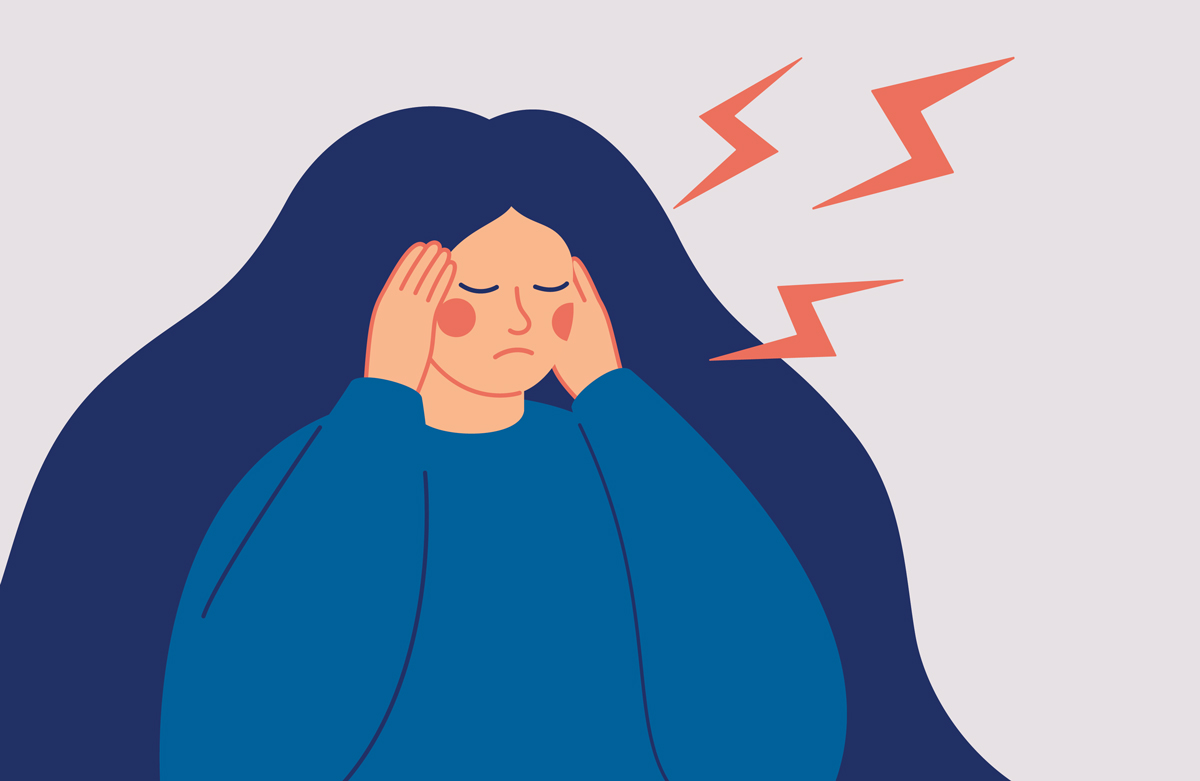- What are migraine headaches?
- What is neural migraine?
- The cause of migraine headaches
- Migraine symptoms
- Migraine aggravating factors
- Treatment of migraine headaches
- How to prevent migraines?
- How many days do migraine attacks last?
Migraine headaches
Migraine headaches are usually known as severe and acute headaches that cause transient complications. Of course, not all headache problems can be diagnosed as migraines. But you can pay attention to some of the following common symptoms:
- Severe pain on one or both sides of the head (usually starts on one side of the head)
- Sensitivity to light or sound
- Nausea or vomiting
- Restlessness or difficulty concentrating
- When a person has a headache, she is afraid of light or sound
Nervous migraine
Neurogenic migraine is a type of migraine in which neurological and neurological factors play a major role in the occurrence and exacerbation of migraine headaches. The symptoms and causes of neuralgic migraine may be different from common migraine or migraine with austenigenia.
Common symptoms of migraine include severe headache and fatigue that usually occurs on one side of the head and may be accompanied by nausea, vomiting, light and sound sensitivity, tingling of the fingertips, impaired concentration, and sensory changes.
Neurological migraine treatment may be different for each person. Migraine medications such as serotonin inhibitors, anti-inflammatories, anticonvulsants, and neurologic medications are commonly used. Also, lifestyle changes, stress management, psychological techniques such as meditation and relaxation exercises also help manage migraine headaches. Depending on the severity and impact of migraines on your daily life, it is best to consult your doctor to help you diagnose and prescribe the right treatment.
The cause of migraine headaches
The exact cause of migraine headaches is not yet known. But research shows that these types of headaches are the result of a combination of genetic and environmental factors. Some of the factors that may play a role in causing migraine headaches are:
- Genetic factors: It has been found that if one of your parents has migraines, you are more likely to suffer from migraines.
- Neurological type: a certain neural structure may cause an abnormal response to everyday stimuli. For example, sensitivity to light or sound has occurred in migraine headaches
- Hormonal changes: Some people believe that changes in hormones such as estrogen can cause migraine headaches. This can be triggered by the natural cycle of hormones, from which it can be concluded that women are more prone to migraine headaches during periods of life such as menstruation and pregnancy.
- Environmental factors: Some environmental factors can affect migraine headaches. These factors include changes in sleep and relaxation, psychological stress, weather conditions (such as changes in air pressure, air pollution, exposure to extreme heat and sun) and diet (such as the use of food supplements and special types of food). Noise pollution of the environment (using headphones especially in adolescence and youth - listening to loud music such as electronic music) can be mentioned.
Please note that in some cases, exactly why migraine headaches occur cannot be explained and may vary from person to person.
Migraine symptoms
Migraine symptoms may vary from person to person, but some common symptoms include:
- Severe and chronic headache: severe pain on one or both sides of the head that may be accompanied by sensitivity to light and sound. In some cases, the pain can spread to the neck and shoulders.
- Nausea or vomiting: Many people with migraines experience nausea or vomiting before or at the same time as a headache.
- Greater sensitivity to light and sound: You may be more sensitive to light or sound and feel cramped.
- Change in food plan: Some people with migraine headaches have changes in their food plan and cannot eat certain foods and substances.
- Restlessness and concentration problems: As a result of a severe headache, you may experience restlessness and anxiety and find it difficult to concentrate on daily tasks.
- Visual effects: Some migraine sufferers experience situations such as induced vision or colorful paintings in their vision during a headache.
If you have experienced more than a few migraine headaches or your symptoms persist for a long time, it is better to consult your doctor. He can give you a correct diagnosis and provide you with a plan to manage your migraine headaches.

Dr. Mohammad Eslami, clinical psychologist
PhD in psychology from a prestigious European university
Psychosomatic diseases fellowship
Licensed by Iran’s psychology system
Member of the Iranian Psychological Association
Migraine aggravating factors
Migraine triggers can be different for each person, but some common factors that can make migraine headaches worse include:
- Stress: Stress and mental pressure can aggravate migraine headaches.
- Hormonal changes: Changes in hormone levels such as estrogen during menstruation or pregnancy can cause migraine headaches to worsen.
- Insufficient sleep or insomnia: Lack of sleep or insufficient sleep can be factors that aggravate migraine headaches.
- Changes in weather: Changes in air pressure, temperature and humidity can accelerate the exacerbation of migraine headaches.
- Certain foods: Some foods such as chocolate, sausages, fast food, caffeinated beverages, nuts, and coffee can act as migraine aggravating factors.
- Lighting and noise: the passenger’s tolerance of unpleasant light and high noise levels can also be factors that aggravate migraines.
If you have identified certain aggravating factors, it is better to avoid them. Also, you may need a doctor’s consultation to more accurately identify your aggravating factors and determine medications and management methods.
Treatment of migraine headaches
There are various methods and treatments to treat migraine headaches. In some cases, a combination of several methods may be used to better manage migraine headaches. In the following, we examine several methods of migraine headache treatment:
- Medications: Anti-migraine medications may be prescribed to help with acute or recurring headaches. These drugs include categories such as analgesics, nonsteroidal anti-inflammatory drugs (NSAIDs), antimigraines, and triptan drugs.
- Hormonal compounds: If hormonal changes are among the causes of your headaches, your doctor may prescribe hormonal compounds, such as estrogen, to affect symptoms.
- Preventive medications: Some medications can be used to prevent headaches. These include beta blockers, antiepileptics, and antidepressants.
- Changes in daily life: Life modifications can help reduce the number and severity of migraine headaches. This includes eating a healthy and balanced diet, getting enough sleep, reducing stress, managing rest and regular physical activity.
- Non-pharmacological methods: This includes self-care, mental relaxation, breathing regulation, massage and relaxation exercises. Also, techniques such as cognitive behavioral therapy (CBT) and movement therapy may also be helpful.د.
How to prevent migraines?
To prevent migraines, you can do the following:
- Identify and manage triggers: Try to identify specific triggers that make your migraine attacks worse. These factors may include certain foods, stresses, environmental changes, etc. Making a note of your triggers and creating a daily pattern can help you manage them.
- Observance of healthy daily life: enough sleep, regular and healthy diet, use rest methods and regular physical activity. Avoiding foods such as chocolate, caffeine, fatty foods and foods with preservatives can also be helpful. Quitting harmful habits such as smoking and alcohol can help improve migraine symptoms.
- Stress management and relaxation: Techniques such as deep breathing, meditation, yoga and relaxation exercises can help reduce stress and facilitate its management.
Each person may need a different approach and treatment. Self-care is very important for those with migraines. This combination of measures and lifestyle can help you reduce migraine symptoms and improve their control. Here are some self-care strategies for managing migraines
How many days do migraine attacks last?
The duration of migraine attacks can vary from a few hours to a few days. Some people experience shorter migraine attacks that can last only a few hours, while others experience longer attacks that may last for several days.
If you have a migraine, you may experience problems such as nausea, vomiting, sensitivity to light and sounds, impaired concentration, and sensory changes during the headache attack.
A maximum duration of 72 hours (three days) is accepted as the definition for migraine attacks. If your attacks last more than 72 hours, it is better to consult your doctor to start the proper treatment and prevent further complications.


